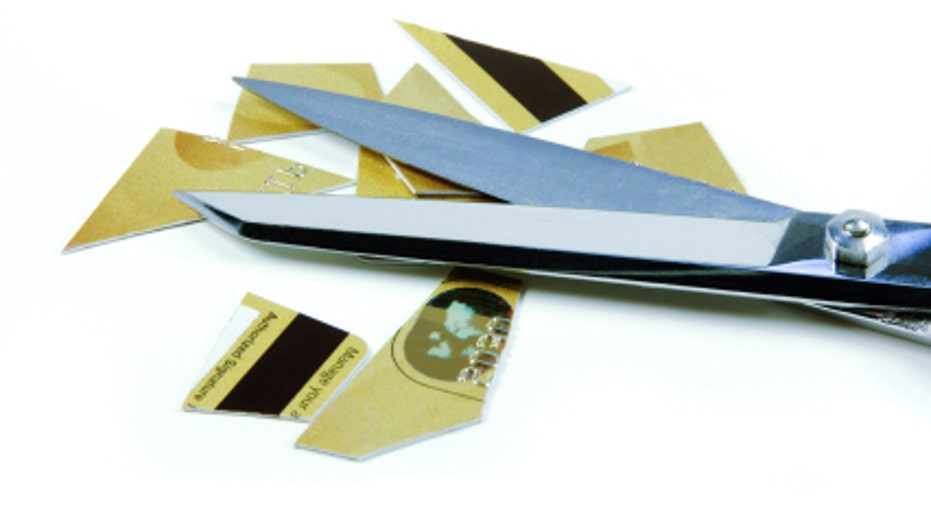Maxed Out Cards? Don't Open Another One

Dear To Her Credit,
I have six credit cards. Five of them are maxed out, but I have one credit card I got recently that I would really like to keep, but I can't pay for the other five. So can I use the new credit card I got and not pay for the other five? Would it affect my new credit card if I don't pay for the other five credit cards?
- Kelly
Dear Kelly,
Seriously, you're thinking about not paying anything at all on five old credit cards, and continuing to make new charges on a new credit card? That would be a huge mistake.
Here are five reasons you shouldn't leave a trail of unpaid bills behind while you rack up more debt:
1. It's wrong. Every time you buy something with a credit card, you promise to pay the amount charged, plus any interest. No matter how difficult your circumstances, charging items on your credit card that you know you cannot pay for is breaking that promise. (Sometimes people do have severe extenuating circumstances, and that's why we have bankruptcy laws.)
2. Missed payments on your old card may affect your new card. Your bank can raise your card's interest rate on new purchases, with 45 days notice, because you miss payments on other cards. It's true that they can no longer raise interest rates on your existing balances because you missed a payment on another card, or even a utility bill -- a practice called "universal default." This practice ended with the Credit CARD Act of 2009. The new law won't help you much if you're adding new debt to your card, however.
3. You're going further into debt. Let's say you have five maxed-out cards at $2,000 each. That would mean you're $10,000 in debt. You take your new card and charge another $2,000. Meanwhile, when you default on your old cards, they'll slap you with late charges and higher interest rates. I've seen credit card balances double or triple in an alarmingly short period of time. A $10,000 debt can turn into $20,000 or more before you know it.
4. Creditors can sue you for nonpayment. If you just stop paying on five credit cards, you'll hear from them. They'll send more notices and call you on the phone. Sure, you can stop them from calling, but you can't stop them from taking action. They can go to court and get a judgment against you, and then possibly attach part of your assets, including your bank account and your paycheck, for repayment.
5. Your credit will be trashed. What happens when you max out the sixth card and need a new one? If any banks are lining up to give you another card, they won't be doing it out of the goodness of their hearts. They'll typically charge much higher interest to make up for the high risk of doing business with you.
6. There is no good endgame to this strategy. What's next? Bankruptcy? Believe it or not, I've heard people talk about bankruptcy as a way of evening the score, of allowing people on insufficient incomes to live beyond their means and periodically get rid of all their debts and start over. Trying to live on too little income is a real problem, but serial bankruptcy is not the answer. It's expensive, time-consuming and traumatic, and doesn't solve the underlying problem. After bankruptcy, you still have the problems that got you into debt in the first place.
So what should you do? Stop adding to the problem. Don't add one dollar to a credit card balance until you have every one of them paid off. If you don't think you can use credit cards without carrying a balance from month to month, perhaps credit cards aren't for you. Stop carrying your cards with you. If that doesn't stop you from using them, chop the cards up.
Next, pay off your credit cards -- all of them. You may need to make drastic changes to improve your cash flow, cut your expenses, or most likely both. Don't be tempted to get out of paying your debts unless you have absolutely no other options. You -- and your credit -- are far better off if you get rid of your debts the old-fashioned way, by working them off.
You're in a swirling vortex of credit card debt, and I'm not sure you even realize it. Five credit cards that you cannot pay, plus a dependence on new credit to get by, is a serious problem. It's threatening your future, including any plans to improve your career, buy a house or reach other personal and financial goals.
Many people have been in situations such as yours, and they've worked their way out. It won't be easy, but you can do it. Learn to take better care of your debt and total financial picture, and you'll have far more freedom and options in life than you ever dreamed of when you were in debt.
See related: 7 things not to do when you've maxed out your credit cards



















